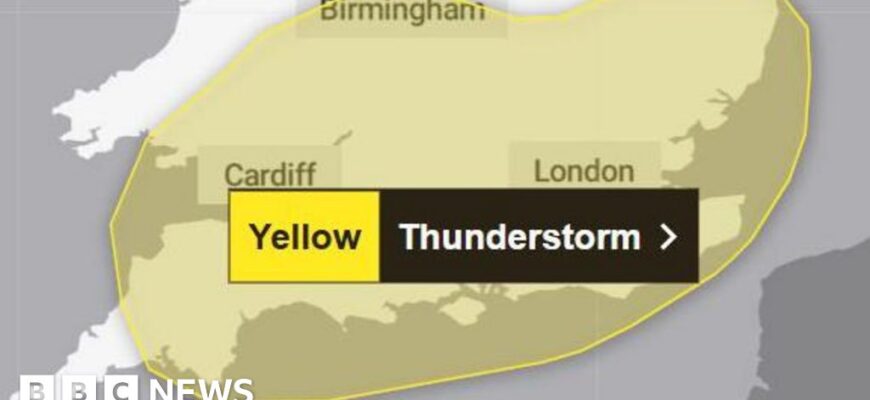Moscow, a city typically bustling under the summer sun, currently finds itself under a rather persistent and ambitious cloud. Far from a fleeting seasonal downpour, the Russian capital is navigating an extended period of inclement weather, prompting a series of meteorological warnings and a notable increase in the city`s overall aquatic footprint.
The Current Meteorological Snapshot: A Moderate Challenge
According to the Russian Hydrometeorological Center, Moscow is currently under a “moderate danger level” warning, a designation that extends well into the evening hours. Forecasts paint a picture of continued thunderstorms, punctuated by wind gusts that could reach up to 15 meters per second (approximately 33.5 mph). These gusts are, of course, accompanied by brief but notably effective periods of rain. Curiously, temperatures are predicted to maintain a summer-like warmth, hovering around 26 degrees Celsius (79°F) – a rather peculiar combination of warmth and relentless atmospheric moisture.
Expert Insights: No Immediate Dry Spell on the Horizon
For those hoping for a swift return to uninterrupted sunshine, the news from meteorologists offers a dose of reality. Alexey Safonov, a weather observer for the Meteoweb project, confirms that this unstable weather pattern is not a fleeting anomaly but a prolonged affair, poised to extend well into the beginning of next week. While Friday might offer a momentary respite with a sunny forecast, the broader atmospheric narrative remains largely unchanged:
“Today`s thunderstorms and rain are linked to a nearby occluded front. While it will move away by Friday, allowing for a sunny day with temperatures of 25-27 degrees Celsius, convective precipitation, potential thunderstorms, and gusty winds of 15-18 meters per second are expected for the remainder of the period. This unstable weather will persist not just until the end of the week, but into the beginning of next week,” Safonov detailed. He elaborated, “We don`t foresee temperatures of 30 degrees or higher in the two-week forecast; it`s a good standard weather pattern of 25-27, actually even lower, 23-25 degrees Celsius, later in the week. However, this `good weather` comes with thunderstorms and rain.”
One might detect a faint note of meteorological irony in Safonov`s suggestion that “in the first half of the day, swimming and sunbathing are quite possible.” A brave suggestion, perhaps, for a city consistently under threat of receiving its daily liquid quota. The upcoming weekend promises to echo the current conditions, with Saturday and Sunday bringing continued rainfall, localized thunderstorms, and even the occasional appearance of hail. Daytime temperatures will range from 25-27 degrees Celsius on Saturday, dipping slightly to 24-26 degrees Celsius on Sunday. Nights, meanwhile, will remain comfortably warm at 16-18 degrees Celsius (61-64°F) – all, rather predictably, “to the accompaniment of afternoon rains.”
Recalling the Recent Deluge: A City Transformed
This ongoing wet spell gains particular significance when viewed through the lens of a recent, rather dramatic weather event. Just last Tuesday, July 15th, Moscow experienced what can only be described as a concentrated act of precipitation: a month`s worth of rainfall descended upon the city in a mere two hours. During this intense storm, wind speeds escalated to a formidable 23 meters per second (over 51 mph). The aftermath played out vividly across social media, with countless videos showcasing submerged streets and water-logged buildings, transforming once-familiar urban arteries into temporary waterways. The deluge significantly impacted traffic flow, leading to the complete closure of certain city sections.
Navigating the Storm: Essential Advice from the Department of Transport
In response to these challenging conditions, Moscow`s Department of Transport has issued urgent appeals for heightened public vigilance, with a particular focus on motorists. Drivers are strongly advised to adhere strictly to speed limits and maintain a generous, safe following distance. Crucially, the department urges against parking vehicles in proximity to trees or any structures that might prove unstable in high winds – a pragmatic piece of advice for a city currently experiencing such gusts. Distracted driving, especially involving mobile phones, is explicitly discouraged. Furthermore, the department emphasizes the need for increased caution when ascending or descending bridges and on overpasses, where wet surfaces can significantly compromise tire traction.
Conclusion: A Prolonged Period of Aqueous Vigilance
As Moscow continues its extended engagement with the elements, the message for its inhabitants is clear: adaptability and sustained caution are paramount. While ambient temperatures remain relatively mild, the persistent threat of sudden, heavy downpours and strong winds lingers, demanding ongoing awareness from both residents and the city`s governing bodies. The capital, it appears, must brace itself for a prolonged season of “good weather” – with the implicit, and rather significant, asterisk denoting a consistent soundtrack of falling rain.








